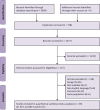Efficacy of psychosocial interventions for psychological and pregnancy outcomes in infertile women and men: a systematic review and meta-analysis
- PMID: 25631310
- PMCID: PMC4316425
- DOI: 10.1136/bmjopen-2014-006592
Efficacy of psychosocial interventions for psychological and pregnancy outcomes in infertile women and men: a systematic review and meta-analysis
Abstract
Objective: To evaluate the evidence on the efficacy of psychosocial interventions for improving pregnancy rates and reducing distress for couples in treatment with assisted reproductive technology (ART).
Design: Systematic review and meta-analysis.
Data sources: PsycINFO, PubMed, EMBASE, CINAHL, Web of Science and The Cochrane Library between 1978 and April 2014.
Study selection: Studies were considered eligible if they evaluated the effect of any psychosocial intervention on clinical pregnancy and/or distress in infertile participants, used a quantitative approach and were published in English.
Data extraction: Study characteristics and results were extracted and the methodological quality was assessed. Effect sizes (ES; Hedges g) were pooled using a random effects model. Heterogeneity was assessed using the Q statistic and I(2), and publication bias was evaluated using Egger's method. Possible moderators and mediators were explored with meta-analyses of variances (ANOVAs) and meta-regression.
Results: We identified 39 eligible studies (total N=2746 men and women) assessing the effects of psychological treatment on pregnancy rates and/or adverse psychological outcomes, including depressive symptoms, anxiety, infertility stress and marital function. Statistically significant and robust overall effects of psychosocial intervention were found for both clinical pregnancy (risk ratio=2.01; CI 1.48 to 2.73; p<0.001) and combined psychological outcomes (Hedges g=0.59; CI 0.38 to 0.80; p=0.001). The pooled ES for psychological outcomes were generally larger for women (g: 0.51 to 0.73) than men (0.13 to 0.34), but the difference only reached statistical significance for depressive symptoms (p=0.004). Meta-regression indicated that larger reductions in anxiety were associated with greater improvement in pregnancy rates (Slope 0.19; p=0.004). No clear-cut differences were found between effects of cognitive-behavioural therapy (CBT; g=0.84), mind-body interventions (0.61) and other intervention types (0.50).
Conclusions: The present meta-analysis suggests that psychosocial interventions for couples in treatment for infertility, in particular CBT, could be efficacious, both in reducing psychological distress and in improving clinical pregnancy rates.
Keywords: Infertility; Psychosocial intervention; distress; pregnancy.
Published by the BMJ Publishing Group Limited. For permission to use (where not already granted under a licence) please go to http://group.bmj.com/group/rights-licensing/permissions.
Figures



Similar articles
-
Psychological and educational interventions for subfertile men and women.Cochrane Database Syst Rev. 2016 Mar 31;3(3):CD011034. doi: 10.1002/14651858.CD011034.pub2. Cochrane Database Syst Rev. 2016. PMID: 27031818 Free PMC article.
-
Psychosocial interventions for men with prostate cancer.Cochrane Database Syst Rev. 2013 Dec 24;2013(12):CD008529. doi: 10.1002/14651858.CD008529.pub3. Cochrane Database Syst Rev. 2013. PMID: 24368598 Free PMC article.
-
Androgens (dehydroepiandrosterone or testosterone) for women undergoing assisted reproduction.Cochrane Database Syst Rev. 2015 Nov 26;2015(11):CD009749. doi: 10.1002/14651858.CD009749.pub2. Cochrane Database Syst Rev. 2015. Update in: Cochrane Database Syst Rev. 2024 Jun 5;6:CD009749. doi: 10.1002/14651858.CD009749.pub3. PMID: 26608695 Free PMC article. Updated.
-
Antioxidants for female subfertility.Cochrane Database Syst Rev. 2013 Aug 5;(8):CD007807. doi: 10.1002/14651858.CD007807.pub2. Cochrane Database Syst Rev. 2013. Update in: Cochrane Database Syst Rev. 2017 Jul 28;7:CD007807. doi: 10.1002/14651858.CD007807.pub3. PMID: 23913583 Updated.
-
Psychological interventions for treatment of inflammatory bowel disease.Cochrane Database Syst Rev. 2025 Apr 17;4(4):CD006913. doi: 10.1002/14651858.CD006913.pub3. Cochrane Database Syst Rev. 2025. PMID: 40243391
Cited by
-
Effectiveness of psychological interventions on mental health, quality of life and relationship satisfaction for individuals and/or couples undergoing fertility treatment: a systematic review and meta-analysis protocol.BMJ Open. 2020 Jul 19;10(7):e036030. doi: 10.1136/bmjopen-2019-036030. BMJ Open. 2020. PMID: 32690514 Free PMC article.
-
Physical and Sedentary Activities in Association with Reproductive Outcomes among Couples Seeking Infertility Treatment: A Prospective Cohort Study.Int J Environ Res Public Health. 2021 Mar 8;18(5):2718. doi: 10.3390/ijerph18052718. Int J Environ Res Public Health. 2021. PMID: 33800259 Free PMC article.
-
Psychological assessment in infertility: A systematic review and meta-analysis.Front Psychol. 2022 Oct 28;13:961722. doi: 10.3389/fpsyg.2022.961722. eCollection 2022. Front Psychol. 2022. PMID: 36389481 Free PMC article. Review.
-
Application of Mindfulness-Based Psychological Interventions in Infertility.J Hum Reprod Sci. 2020 Jan-Mar;13(1):3-21. doi: 10.4103/jhrs.JHRS_51_19. Epub 2020 Apr 7. J Hum Reprod Sci. 2020. PMID: 32577063 Free PMC article. Review.
-
Self-reported quality of life scales in women undergoing oocyte freezing versus in vitro fertilization.J Assist Reprod Genet. 2020 Oct;37(10):2419-2425. doi: 10.1007/s10815-020-01916-1. Epub 2020 Aug 13. J Assist Reprod Genet. 2020. PMID: 32794124 Free PMC article.
References
Publication types
MeSH terms
LinkOut - more resources
Full Text Sources
Other Literature Sources
Medical
Miscellaneous
